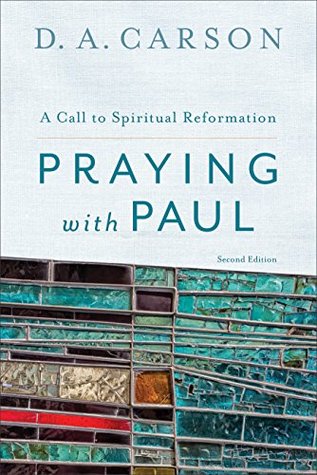More on this book
Community
Kindle Notes & Highlights
by
D.A. Carson
Read between
November 14 - December 1, 2019
Robert Murray M’Cheyne declared, “What a man is alone and on his knees before God, that he is, and no more.”
J. I. Packer when he writes, “I believe that prayer is the measure of the man, spiritually, in a way that nothing else is, so that how we pray is as important a question as we can ever face”?1
1. Much praying is not done because we do not plan to pray.
This is the fundamental reason why set times for prayer are important: they ensure that vague desires for prayer are concretized in regular practice.
The reason we pray so little is that we do not plan to pray. Wise planning will ensure that we devote ourselves to prayer often, even if for brief periods: it is better to pray often with brevity than rarely but at length.
2. Adopt practical ways to impede mental drift.
But you can do many things to stamp out daydreaming, to stifle reveries. One of the most useful things is to vocalize your prayers. This does not mean they have to be so loud that they become a distraction to others, or worse, a kind of pious showing off. It simply means you articulate your prayers, moving your lips perhaps; the energy devoted to expressing your thoughts in words and sentences will order and discipline your mind and help deter meandering.
Another thing you can do is pray over the Scriptures.
None of these analogies is perfect, of course. But it is exceedingly important to remember that prayer is not magic and that God is personal as well as sovereign.
effective prayer is the fruit of a relationship with God, not a technique for acquiring blessings.
7. If you are in any form of spiritual leadership, work at your public prayers.
public praying is a pedagogical opportunity. It provides the one who is praying with an opportunity to instruct or encourage or edify all who hear the prayer.
Public praying is a responsibility as well as a privilege.
8. Pray until you pray.
Brothers and sisters in Christ, at the heart of all our praying must be a biblical vision. That vision embraces who God is, what he has done, who we are, where we are going, what we must value and cherish. That vision drives us toward increasing conformity with Jesus, toward lives lived in the light of eternity, toward hearty echoing of the church’s ongoing cry, “Even so, come, Lord Jesus!” That vision must shape our prayers, so that the things that most concern us in prayer are those that concern the heart of God. Then we will persevere in our praying, until we reach the goal God himself has
...more
If we follow Paul’s example, then, we will never overlook the monumental importance of praying for others. Prayer will never descend to the level where it is nothing more than a retreat house in which we find strength for ourselves, whether through the celebration of praise or through a mystic communion with God or through the relief of casting our cares upon the Almighty. Prayer may embrace all these elements, and more, but if we learn to pray


